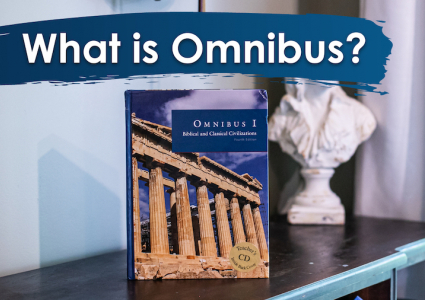3 Ways the Great Books CAN Prepare Children for Communion with God

Destinations matter. This truth punched me in the gut as I led a field trip to the Metropolitan Museum of Art in New York City. It was there that I learned the difference between an express train and a local train. I was 25 years young and I had a bunch of 8th graders with me. Yes, destinations matter.
So, it is important to ask this question: “What is the desired destination of the Omnibus? What is its intended last stop?” Over the years I have encountered parents and students, who say, usually sheepishly because they know I am pretty closely tied to the Omnibus curriculum, “Mr. Fischer, why don’t we just stop reading all these Great Books and just study the Bible?” This is actually a really good question. The implication is clear: isn’t just reading the Scriptures all I need to get to heaven? Why do we think that reading the Great Books and discussion those ideas help students reach the Celestial City? If we are trying to get to heaven, why stop in Thermopylae, Rome, Florence, and New York?
The intention of everyone involved in the creation of the Omnibus curriculum is that the last stop for our students would be communion with God. At times when we have a really good discussion in an Omnibus class, particularly the one about the return of Christ, I say, “Perhaps we can take this same discussion up in heaven. We will probably know more then.” In this post, I want to point out three important ways that studying the Scriptures and the Great Books can prepare students for communion with God. As you study Omnibus, if you remember these three things, you provide some good opportunities for students to grow in grace.
Way 1: Make the Bible Something that Students are Challenged to Understand and With Which They are Challenged to Wrestle
The Omnibus contains all of the Books of the Bible, so if you complete Omnibus I – VI, you will cover all of God’s Word. Also, in the Biblical Analysis section of every Discussion, God’s Word is brought to bear. All of that is fine and well, but for students to grow as believers, I think that it is crucial to approach the Scriptures in a particular way.
As a teacher, don’t decouple devotion from the study of Scripture. Teach your students to search the Scriptures and to love the God that they find in the Scriptures. God’s Word must correct our cultural misconceptions about Him. Also, modeling for your students how particular parts of God’s Word impact you devotionally can be crucial.
As you consider God’s Word, don’t give students the answers. Make them think about it. Even if they initially start to row the boat in the wrong direction, let them go for a time. Try to challenge them with questions rather than by providing answers. Why? Because we are teaching Omnibus to students during that time of life when they are starting to differentiate what they believe from what their parents believe. Now, I wanted my daughters to believe exactly what I believe, but I don’t want them to believe because I believe. They have to wrestle with God’s Word and commit themselves to it.
This can be an uncomfortable process. Sometimes students get things turned around in their minds. Being a teacher helps you see how various heresies got started in the church! But be patient. Help them figure it out rather than quickly telling them what they should believe. Approaching the Scriptures in this manner as we study Omnibus helps prepare students for communion with God.
Way 2: Listen to All that the Books are Saying like Children Learning from their Fathers
As we read the Great Books, I often think about the Commandment to Honor our Fathers and Mothers. By reading the Great Books, we enter into the minds of our fathers in the faith. We hear their wisdom and we honor them by learning from them. Sometimes they get it wrong—very wrong. But we can learn from that too.
Make sure that students hear all that the Great Books are telling them. They need to know the despair of life without God in the agony that ancient pagans felt when, like Achilles, they saw the futility of life. They need to know how absolute power in the hands of sinful men results in the brutality and wickedness of some of the Roman Emperors. They also need to see that God gives great insights to humans—even to people who do not know Him. Knowing this, helps to liberate students from the narrow view that only Christians have useful knowledge—a view that will be exploded when they rub shoulders with people in their daily lives. Listen to our fathers and mothers as we study Omnibus helps prepare our students to know God and His world more fully.
Way 3: Make sure that you Come to The Study of Omnibus as Humbling Rather than a Pride-filled Adventure
Sometimes we can lose traction on our path toward God by using good things in the wrong way. This can happen with Omnibus. As a teacher or student, approach the Scriptures and the Great Books with humility instead of using what you learn as a way to know more than others. This can be a great temptation for the most gifted students. Learning truth should humble us. It should help us know our weakness and expose our ignorance.
This starts with the teacher. Be a model of humility yourself. Listen to yourself during discussions. Are you, as the teacher, dominating discussions? Let your students talk more. Discipline yourself to listen to them, know them, and guide them instead of simply lecturing to them.
As you love the material before your class, love it in a way that demonstrates wonder when appropriate. Wonder will feed the fires of the love of learning. Love pushes out pride and makes way for joy. Learning to approach the Great Books with childlike humility and wonder helps prepare students for deeper communion with God.





